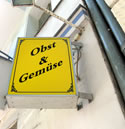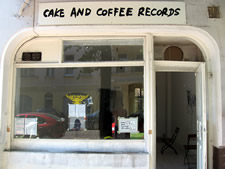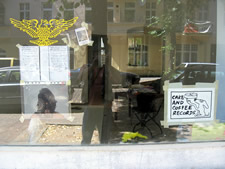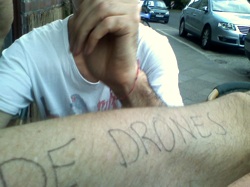Cake & Coffee
(Tuned City, Berlin _ii)
(( --> [ _o ] [ _one. ] [ _two. ] [ _three. ] [ _four. ] [ _five. ] [ _six. ] || [ found ] ))
november 07, 2008.
Rinus rents a flat in the midst of Neukölln, in the Weserstraße. De facto this is das kleine headquarters. I found it to be pretty much as expected: nothing but the essentials. Apart from the bedroom, headquarters is pretty much bare. In the spacious living room there is a table. That's the studio. It comes covered with cassette equipment and tapes. Next to the table, in front of the window, stand an old chair and a television set, to watch football and Sturm der Liebe. And then there's a convertible sofa, pushed against one of the walls. For visitors to sleep on.
It was very hot in Berlin the first week of july, with the temperature gradually rising.
However hip and upcoming, no official Tuned City activities were planned in Neukölln. The bulk of the conference's actions took place in and around Berlin-Mitte, the center of town. That's where the Tuned City headquarters was, at the Pfefferberg.
Thus das kleine related to Tuned City as Neukölln does
to Mitte.
Neukölln and Mitte are worlds apart.
This is true in any case.
It is even truer
when your budget's tight.
I overheard Rinus ruminate, several times, about leaving Neukölln nevermore.
Maybe even restrict das kleine's activities to the area of
the long Weserstraße and its many side streets, where new galleries and otherwise 'young and arty' spaces are sprouting
like mushrooms in the former ENCI
bos ( * ) ? ... He found us
one of these to use, just a couple of blocks from headquarters. The
idea was to borrow some of the momentum of the festival, and do an 'off Tuned City' edition of das kleine
there on saturday july 5th. Rinus also arranged for me to use it during the week to get
on with my foundtaping. The place formerly was home to a vegetable shop, now being
transformed into a gallery space annex record shop by Adrian Scholz and
friends, who have a record label called Cake
& Coffee Records. Their main release - up till now - comes with the
intriguing title "He ate a lamp now he's a fan", an album by a
very 1980s post-pop, and yet joyful and optimistic sounding
outfit going by the name of La
Batterie.
where new galleries and otherwise 'young and arty' spaces are sprouting
like mushrooms in the former ENCI
bos ( * ) ? ... He found us
one of these to use, just a couple of blocks from headquarters. The
idea was to borrow some of the momentum of the festival, and do an 'off Tuned City' edition of das kleine
there on saturday july 5th. Rinus also arranged for me to use it during the week to get
on with my foundtaping. The place formerly was home to a vegetable shop, now being
transformed into a gallery space annex record shop by Adrian Scholz and
friends, who have a record label called Cake
& Coffee Records. Their main release - up till now - comes with the
intriguing title "He ate a lamp now he's a fan", an album by a
very 1980s post-pop, and yet joyful and optimistic sounding
outfit going by the name of La
Batterie.
Adrian and co. were painting the place, working on the electricity and stuff, and putting up the outside signs. Otherwise it was ... well ... empty ... thus highly suitable for a found tapes exposition ... (Click the pictures to enlarge).
 |
 |
Now this was absolutely wonderful, but it also made it less urgent hence more difficult
to leave Neukölln ... But then of course (primo) we had
to, and (secundo) we wanted to ...
And so, nevertheless, we did.
Walking.
Musing over a beer at a court-yard table in the dark quiet of the Neukölln night together with Wolfgang Dorninger, who had come over from Austria to perform at das kleine with his Phonographic Arkestra, and who for the week shared das kleine headquarters with us, Rinus insisted that this was what he always had wanted: experiencing a metropolis like Berlin exclusively on foot ... "Wenn man mit 'm Fahrrad ist, dann geht das doch noch etwas zu schnell ...," he said. It made Wolfgang laugh. "I think you should use a bicycle. But you don't even have a bicycle ... And then you dutch are such wonderful cyclists ..." He brought up Joop Zoetemelk, and then I dropped Jan Janssen. That seemed to sudddenly bring back memories, for each of us our own. We fell silent for a while. In my dictaphone recording one hears nothing but 1, 2, maybe 3, zips of beer, and the steady humming of the little machine's electric motor. Neukölln backyards on early summer nights are very peaceful indeed, very quiet ...
Without a car, with no bicycles, and given both the lightness of our budget and the wonderful weather, it was sort of obvious, really, that we would spend the little money we had on beer instead of on u-bahn trains or on busses. From the very start we knew we would be walking there and back again.
In one of his recent reports on das kleine, Rinus reflects upon a vision of fieldrecordists as a new generation of sound story tellers that is about to embark. He rather explicitly views this upcoming community of artists and audiences, who share a mindful attention to the sound of their environment and its schizophonic rendering and manipulation, as part of aural tradition. Aural traditions center around sound-based communication that emphasizes metaphoric similes, emotional resonance and the creation of group experiences. Now it is easy to argue that despite an undeniable specularity, also much of contemporary, and especially popular, culture thus is rooted in aural tradition. I'd rather say that what distinguishes some - but certainly not all - of the art based on field recordings is not so much its presumed 'aurality', but rather the artists' attempt at shared, as opposed to imposed experiences. (As within the community of free improvisation, really, with which this upcoming [?] community has quite a bit in common.) The essential difference lies in the way attention is asked, and the way in which attention is given. Maybe indeed this goes with a difference in pace. "In a society based on aural tradition people move by foot," Rinus wrote.
And so we did.
It gave rise to a rather curious daily ritual, that nicely illustrates this difference in pace, metaphorically. After an early rise I would spend the first part of the day at Cake & Coffee's, working at foundtaping. Around half past three I would join Rinus at das kleine headquarters, who'd be there watching the day's episode of Sturm der Liebe. After the episode's end, around four, we'd set out on foot through sun flooded Berlin streets for Mitte, to attend a Tuned City activity starting at five. On tuesday this was the opening of the Sirens exhibition at general public; on wednesday the opening of Brandon Labelle's exposition Room Tone (18 sounds in 6 models), at Staalplaat-Le Petit Mignon's in the Torstraße.
Now
from here to there, were one to take the shortest way, takes somewhat over
7 kilometers.
 But we didn't take that shortest route. For sure there is a nicer
one. A different one. A little detour here, a little detour there. Sometimes
preferring the shadowy sides over the sunny ones; sometimes doing the opposite.
We would walk slowly because of the heat. We would choose the paths that
ran along the riverside. We would talk. Rinus speculated on
what tomorrow's Sturm der Liebe would bring, and I would pick up a bit of
crumpled tape here and there along the way. Sometimes we would stand somewhere
to look and listen. It was a pleasure, really. Oh, and on
tuesday underway we also went into some print shop, to make flyers that
could be handed out at Tuned City for saturday's das kleine intiem
at Cake & Coffee in Neukölln.
But we didn't take that shortest route. For sure there is a nicer
one. A different one. A little detour here, a little detour there. Sometimes
preferring the shadowy sides over the sunny ones; sometimes doing the opposite.
We would walk slowly because of the heat. We would choose the paths that
ran along the riverside. We would talk. Rinus speculated on
what tomorrow's Sturm der Liebe would bring, and I would pick up a bit of
crumpled tape here and there along the way. Sometimes we would stand somewhere
to look and listen. It was a pleasure, really. Oh, and on
tuesday underway we also went into some print shop, to make flyers that
could be handed out at Tuned City for saturday's das kleine intiem
at Cake & Coffee in Neukölln.
But of course at such a pace it took
a long time to get from Neukölln to Mitte. A very long time.
Whence both on tuesday and on wednesday we arrived for the event we intended to attend at a time that most of the
attendees had already left or were about to.
We then hung around for a while, sat to rest our weary feet, had a couple of beers, only to brace ourselves for a long
slow walk back from Mitte to Neukölln ...
You'll probably say to yourselves that the previous paragraph must be written in hyperbole.
Well okay, yes. I did exaggerate a bit.
But only a little.
As far as wednesday goes, the description is absolutely accurate.
But though indeed also arriving far too late for the Sirens-expo opening,
on tuesday we actually stayed at Pfefferberg for the evening, and the official
opening of Tuned City.
It was only right that we were there.
The large organizing and production team, including many volunteers, and directed by Carsten Stabenow, did a marvelous job. It was no little achievement to make it possible for such an impressive number of artists, scientists, those that somehow were both, as well as a healthy number of whatchamacallits to meet - or meet again - in Berlin, and present thoughts and work in some way related to the broad theme of sound, space, building and the city. A great many of the participants and other conference- and/or workshop-goers were there at the Pfefferberg for the opening night.
After due thanks to all of its sponsors, Tuned City opened with an enthusiastic
lecture by Barry Blesser,
who together with his companion Linda Ruth-Stalter wrote a book on aural
architecture and the experience of space through attentive listening: Spaces
Speak, Are You Listening?
On his website you can find an introductory
overview of the book that gives a good impression of what Barry talked
about.
Second speaker was spanish architect Antón García-Abril, son of the spanish composer of the same name. Antón talked not so much about aural architecture, as about two projects he and his team realized on the grounds of the 'university park' Vista Allegre in Santiago de Compostella and whose function was somehow music related: the building for the Musical Studies Center and the central office for the SGAE, the General Society of Authors and Publishers. Both, but especially the second one, are pretty much amazing, though Rinus rightfully wondered whether those living in the - apparently - social housing on the other side of the road will have been happy having their view on the park suddenly blocked by the SGAE office's back side, which visually is dramatically less spectacular than is its front side ...
We then celebrated Tuned City's coming into being outside at the Pfefferberg. While the lecture hall was emptied of its seats for a couple of upcoming performances, we had white wine with bubbles and met up with some of the many fine people that came along to party.
"He has bees!" Rinus called out at some point, laughing out loudly
and gesticulating with both of his arms. He stood next to Andrius Rugys, aka
PB8, from
Vilnius in Lithuania. We had met before, on the occasion of last year's
das kleine, when Andrius came and performed at our secret
concert in Kunstraum Takt. This year he came over to Tuned City. He
participated in the - very popular indeed - workshop led by Chris Watson,
entitled Hearing
Berlin. Watson was a founding member of industrial noise music pioneers
Cabaret
Voltaire. This made me think that I must have met him before, when early
1982 I interviewed the band at their Western Works studio in Sheffield for
Vinyl Magazine ( ** ), on the occasion of the band's
contribution of a track to the magazine's monthly flexi-disc. But
upon re-reading that article, I found that at the time Watson had already
left Cabaret Voltaire, and began working for Tyne
Tees Television. It was the start of Watson's career as a field-sound
recordist. Watson, undoubtedly, was one of the Tuned City stars.
Not so much because of his early involvement with Cabaret Voltaire, but
rather because he went on to become one of the leading specialists in high-end,
'truer than life', recording, especially of nature and wildlife sounds.
I joined Rinus and Andrius. "He has bees!" Rinus said once more.
"Andrius found a tape, or what? A recording?"
"He found bees! Migrating bees. They were all together, without a house."
"And he took them? He has brought them here?"
"No, the recordings! ... He took the bees in a box, and then he took the box to his house.
There he called the director of the botanical garden, and he said: 'I found bees, and I want a house for them!'
The director said: 'Okay, you can bring them to the botanical garden, and they can live there. We've got everything ...' ...
But he has the recordings. So Andrius can come on saturday to Cake & Coffee. He should play them for us."
I missed the evening's first performance, by the dutch BMB con, as I stood outside chatting with Staalplaat Soundsystem's Geert-Jan Hobijn. The last time I saw Geert-Jan must have been around 1984, when with Ronald Heiloo and Tim Benjamin we performed our Iörmungandur in the Amsterdam NL-Centrum, a recording of which was distributed by the then still young Staalplaat. So I do feel excused, though maybe I'd rather would have missed the second performance, by Randy Yau and Scott Arford. In Infrasound the duo attempts at the creation of a physical sound experience, playing "with the resonance of material, with acoustic phenomena, sound cancellation and sound shadows". Though obviously Infrasound conceptually fitted Tuned City's thematics like a glove, that evening I was not really in the mood to walk around in silence and have my spine shaken by very loud but unhearably low frequencies. For some reason though I did record much of it. As of course the vibrations that Yau and Arford produced lie way beyond the range of my dictaphone, the recording is actually a recording of the silent attention of the audience that evening at the Pfefferberg. You can listen to parts of it in "Some sounds are like shadows", the second in my series of radio-dicta-phonic reports on Tuned City.
Rinus and I headed back to Neukölln around midnight, under a cloudless sky. I looked up, up quite a bit, away from my feet, and one could even see some stars. Somewhat over an hour later, we arrived at the border of Kreuzberg and Neukölln. There we stopped at a turkish night shop and bought some drinks. We sat down for a while at the table that was on the pavement in front of the store, next to two big but friendly germans.
"Mok mok jaha!" one of them cheered. That's what it sounded like. I don't know if I got the spelling right. I don't even know whether I understood him rightly. But I did hear him say it over again: "Mok mok jaha!" ... He told us this was Klingonisch. "Ruhm und Ehre: mok mok jaha," he said. "You can learn it, it's the extra-terrestrial language that the Klingons speak, you know ... in Star Trek." He had learned to speak some Klingon. And so apparently had his drinking friend, whom he just had met. Since they had been enjoying each other's company out here on this Kreuzberg pavement, raising their bottles and wishing for mok mok jaha.
It took us another hour to get to the Weserstraße, and I continued to look upwards, always upwards, whence a starship might have come. But it didn't, and the next day my feet hurt a lot.
Mok mok jaha for das kleine in Berlin was still lying ahead.
[ ![]() Dictaphone
recordings from the first Tuned City day are part of "Some sounds are
like shadows", which is the second in the series of radio-dicta-phonic
sound reports that audio-document my stay at Neukölln, Tuned City and das
kleine during the first week of this year's july. Together these reports
constitute the 14th edition of Raudio, which will evolve into its final form over the next couple
of weeks or so. If you have Quicktime installed, you are invited to listen
to Raudio by clicking the icon above. ]
Dictaphone
recordings from the first Tuned City day are part of "Some sounds are
like shadows", which is the second in the series of radio-dicta-phonic
sound reports that audio-document my stay at Neukölln, Tuned City and das
kleine during the first week of this year's july. Together these reports
constitute the 14th edition of Raudio, which will evolve into its final form over the next couple
of weeks or so. If you have Quicktime installed, you are invited to listen
to Raudio by clicking the icon above. ]
- next: Neurosen der Präzision -
notes __ ::
(*) That is - or actually and sadly was - a 'forest' near Maastricht in the Netherlands
where we went with the classes when I was at primary school, every early autumn, to collect leaves and mushrooms.
[ ^ ]
(**) 'Varken-Beeld-Geluid-Kater', VINYL 13, april 1982 [
^ ]
tags: Berlin, Neukölln, das kleine
# .280.
comments for Cake & Coffee ::
|
Comments are disabled |
Read about Berlin on the SoundBlog:
(august 4, 2022) - Berlin: Zero Cohesion (3)
(july 24, 2022) - Berlin: Zero Cohesion (2 = ©)
(july 11, 2022) - Berlin: Zero Cohesion (1)
(november 11, 2021) - A Berlin Reader
(august 05, 2011) - (I can't get no) Immediate Satisfaction (Diktat in Berlin_iii)
(july 31, 2011) - 'Kommt raussi!' (Diktat in Berlin_ii)
(july 29, 2011) - 'Where ist Ausland?' (Diktat in Berlin_i)
(february 07, 2009) - « Mok mok jaha für das kleine in Berlin (Tuned City, Berlin_vi)
(december 23, 2008) - « das kleine, Intiem » (Tuned City, Berlin_v)
(december 08, 2008) - un-Tuned City (foundtaping in Neukölln) (Tuned City, Berlin_iv)
(november 12, 2008) - Neurosen der Präzision (Tuned City, Berlin_iii)
(november 07, 2008) - Cake & Coffee (Tuned City, Berlin_ii)
(october 29, 2008) - Light budget, heavy thinking (Tuned City, Berlin_i)
(october 12, 2008) - Hanna's Sirens (Tuned City, Berlin_o)
(july 01, 2007) - dinges (Back to Berlin, iii_3)
(april 25, 2007) - Fluxissage
(april 12, 2007) - reek or (Back to Berlin, iii_2)
(april 08, 2007) - i feelt (Back to Berlin, iii_1)
(march 07, 2007) - found tapes (Back to Berlin, ii)
(february 27, 2007) - "Bo tuny te..." (Back to Berlin, i)